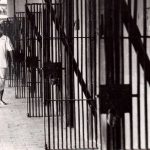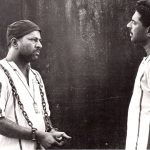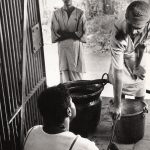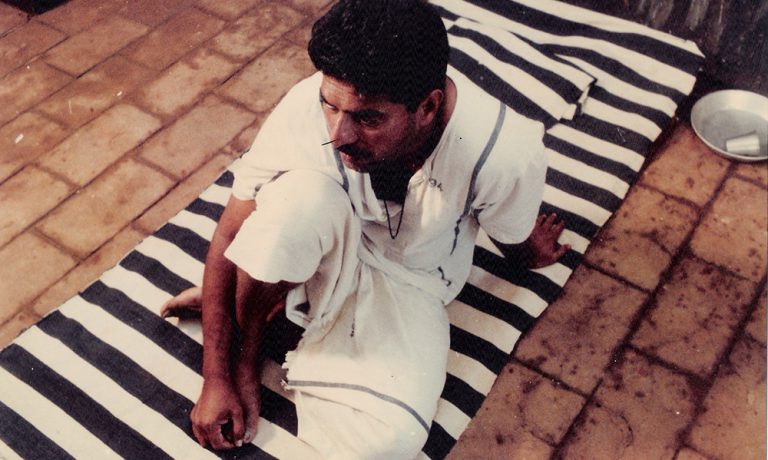Festivals:
Venice, Pusan, Milan, Nantes, Manosque, Amiens, Munich, Fribourg, Rotterdam, Vienna, London, Ljubljana, Torento, Los Angeles,Washington, New York, Hawaii, Istanbul and Haifa among others.
Awards:
International Film Critics Prize (FIPRESCI) Venice, UNICEF Film Prize Venice, Ecumenical Film Prize Amiens, Best Film and Best Director Auberville film festival for Youth.
National Awards for Best Director, Best Actor, Best Sound and Best Malayalam film.
Kerala State Award for Best Story
Synopsis
Mathilukal is a free adaptation of the novelette of the same name, written by the celebrated Malayalam writer, Vaikom Muhammad Basheer.
Autobiographical in character, it is set against the background of India’s freedom struggle in the ’40s when he was serving a term of imprisonment in the Trivandrum Central Jail.
 Basheer embodies the spirit of the free mind. His formal education had stopped with the fourth form when, heeding Gandhi’s call, he ran away from school to take part in India’s freedom struggle. He was beaten up by the police and jailed for defying the Salt Laws. On coming out of jail, he organised a terrorist movement on the Bhagat Singh model – which again set the police on his trail. He left his home in Kerala and wandered around the country for nearly seven years. Worked as deckhand, cook, compositor, tutor, palmist among many other odd jobs – and donned the robes of both sufi and sanyasin. On returning home, he was promptly picked up by the police of the tyrannical Dewan of Travancore.*
Basheer embodies the spirit of the free mind. His formal education had stopped with the fourth form when, heeding Gandhi’s call, he ran away from school to take part in India’s freedom struggle. He was beaten up by the police and jailed for defying the Salt Laws. On coming out of jail, he organised a terrorist movement on the Bhagat Singh model – which again set the police on his trail. He left his home in Kerala and wandered around the country for nearly seven years. Worked as deckhand, cook, compositor, tutor, palmist among many other odd jobs – and donned the robes of both sufi and sanyasin. On returning home, he was promptly picked up by the police of the tyrannical Dewan of Travancore.*When the film opens, we see Basheer in a police lock-up, quite at home in the company of a few petty criminals. He has been languishing there for more than a year now without a trial.
The Police Inspector who is notorious for his cruelty, however, develops a liking for Basheer and his writings. It is on his advice that Basheer resorts to a hunger strike, is arrested, and gets finally taken to the court for trial.
The judge finds Basheer guilty on many charges, real as well as fabricated, and sentences him to two and a half years of rigorous imprisonment.
He is taken to the Central Jail by two friendly policemen who present him with two bundles of beedis, a box of matches and a blade – all forbidden in jail.
The head warder first confiscates, then eventually returns these to him, marking the beginning of a long-lasting friendship.
 Basheer’s simplicity, humour and humanism win him friends all over, no matter whether they are hardened criminals or strict jail officials. His old compositor friend, Ramankutty, is the hospital orderly there, and Abdul Razak, the meal server opens his heart to him like a brother. He also meets his old classmate – now in chains for having assaulted a warder. The Assistant Jailor, one of Basheer’s admirers, comes to visit him often for a lively chat, bringing with him writing materials and appreciation for Basheer’s writings from beyond prison walls.
Basheer’s simplicity, humour and humanism win him friends all over, no matter whether they are hardened criminals or strict jail officials. His old compositor friend, Ramankutty, is the hospital orderly there, and Abdul Razak, the meal server opens his heart to him like a brother. He also meets his old classmate – now in chains for having assaulted a warder. The Assistant Jailor, one of Basheer’s admirers, comes to visit him often for a lively chat, bringing with him writing materials and appreciation for Basheer’s writings from beyond prison walls.Basheer is frustrated, desperate and alone. His friends leave – life becomes eventless. He wanders through the vacant corridors and the garden aimlessly. He talks to the trees and flowers, quarrels with the squirrels. He hatches a plot for breaking out of jail…
 And then, suddenly, the emptiness is lanced by the voice of a woman from over the wall – from the women’s jail. Life starts afresh for Basheer. A tender relationship develops between the two though they cannot see each other. Then, at last, it seems as if they can meet: they fix the time and place…
And then, suddenly, the emptiness is lanced by the voice of a woman from over the wall – from the women’s jail. Life starts afresh for Basheer. A tender relationship develops between the two though they cannot see each other. Then, at last, it seems as if they can meet: they fix the time and place…
On the morning of the day they are to meet, comes the order for Basheer’s release. It comes as a shock. For Basheer, the meaning of freedom is not the same as before…
* Travancore was a small principality on the southern tip of British India. The nationwide Gandhian struggle for freedom from British rule was at its peak in the early ’40s. The Travancore rulers had a soft spot for the freedom movement led by the National Congress. Consequently, the freedom-fighters in the jails of Travancore enjoyed a few privileges forbidden to others.
Sir C.P.Ramaswamy Iyer was the Dewan (Chief Minister) of Travancore then. Freedom within sight, the ambitious Dewan was already scheming to declare Travancore a sovereign state, inde pendent of the Indian Union.
Director’s Statement
Vaikom Muhammad Basheer is a favourite writer of mine. He is perhaps the most original author in Malayalam, my mother- tongue. Sometime early ’88, I re-read his autobiographical novelette, Mathilukal, after a long time, and found it just as gripping.
The idea of giving shape to a complex character only through the voice, and of developing an intense relationship between two people separated by a wall, was simply fascinating.
Having decided to adapt the story I went about it as if I were making a film based on one of my own original ideas. I took the liberty to introduce my own characters and incidents, cut out some of the author’s, and borrowed a few from other of his prison stories. All along, my effort has been to make a film faithful to Basheer and yet one that has a life of its own. In this process, the narrator in the story became Basheer himself and the film evolved as much as a piece about Basheer as one based on his story.
The result, I believe, is an exploration into the creative mind of a writer and a great humanist.
At another level, it is a film about freedom. It asks the fundamental question of what freedom really means.
But the writer – the artist – surrounded by walls, can transcend them with his creativity. He can even create a woman for company and get inextricably involved with his own creation.
The film is also about life and death: the regimentation of life and the liberation of death. About how you reconcile yourself even to an inhospitable habitat like the prison (life) – then are suddenly let out to the freedom (death) of uncertainty. This metaphysical level is perhaps the least apparent.
Filmmakers and Critics Say
X-rays of the Mind
What happens to his people is of less importance than the way it happens to them. The plot, no more than a pretext, is a reference point to come close, even to X-ray the mind of his protagonists.
Witty and relaxed, yet meaningful and rigorous, (in ‘The Walls’) the director achieves an enigmatic portrait of a man who finds a new definition of freedom.
-Khalid Mohamed in
THE TIMES OF INDIA’, Bombay
Mind In Pincers
Mammootty, the number one star of Malayalam films, who plays Basheer comes up with his best performance ever. This is the kind of role he was searching for ever since he played a smaller part in Adoor’s The Monologue.
While Adoor is understandably pleased with the result, Doordarshan too has something to be proud of. Few could have imagined that the union of the offbeat Adoor and a government- controlled TV network could produce a work of such mastery.
–Ramesh Menon in
INDIA TODAY, New Delhi
A dialogue with life
It is this shifting, ungraspable relationship between regimentation and a retreat into one’s self, between ‘inside’ and ‘outside’, that ranks this apparently simple film with Adoor’s other complex efforts.
-Iqbal Masud in EXPRESS magazine, Bombay
Immaculate pace and rhythm
The other great strength of the film is the warmth of Mammootty’s subtle performance, totally different from his usual heroic screen persona. And, above all, the control of pace and rhythm by Gopalakrishnan is immaculate as is the dark and eloquent photography from Ravi Varma.
-Derek Malcolm in Sight and Sound, UK
Masterful simplicity
-Deborah Yung in VARIETY, USA
Credits
- Script, Dialogue & Direction: Adoor Gopalakrishnan
- Based on the short story titled, Mathilukal by Vaikom Muhammed Basheer
- Story: Vaikom Muhammad Basheer
- Photography: Ravi Varma
- Audiography: Hari Kumar
- Editing: M. Mani
- Music: Vijaya Bhaskar
- Art Direction & Costumes: Sivan
- Make-up: P.N.Mani
- Chief Assistant: Meera Sahib
- Production Controller: MP. Sukumaran Nair
- Production Company: Adoor Gopalakrishnan Productions
- Stills: Mohan,Nana
- Sponsor: Doordarshan, India
- Country: India
- Format: 35mm Color
- Duration 117 Minutes
- Year of Production 1990
Cast & Characters
- Mammootty (Basheer)
- Thilakan (head warder)
- Murali (Basheer’s classmate)
- Ravi Vallathol (Razak)
- Karamana (political leader)
- Sreenath (jailor)
- Babu Namboodiri (trade union leader)
- Jagannnatha Varma (judge)
- Vempayam (habitual criminal)
- Azeez (police inspector)
- P.C. Soman (head constable)
- B.K.Nair (old convict)
- Prof. Aliyar, Raghu, P.I.Jacob, Mathew, Santosh (jail warders)
- P.Ganga, Somasekharan Nair, Krishnakumar, K.P.S. Kurup, Shanmukham Pillai, Kaladharan, Krishnankutty Nair, Bhaskaran Nair (political leaders)
- M.R.Gopakumar(convict)
- Rajan Mannarakkayam (deaf and mute convict)
- Gopalakrishnan (hospital orderly)
- Gopinathan Nair (jailor)
- Sreeni (detenu)
- Lalita (Narayani’s voice)
Enquiries:
Darsanam, Trivandrum 695 017,
Kerala, India.
Tel: (047D-8519 – and
Director General,
Doordarshan, New Delhi.
More Stills: |
|||||
 |
 |
 |
 |
 |
|
Working Stills: |
|
 |
 |

